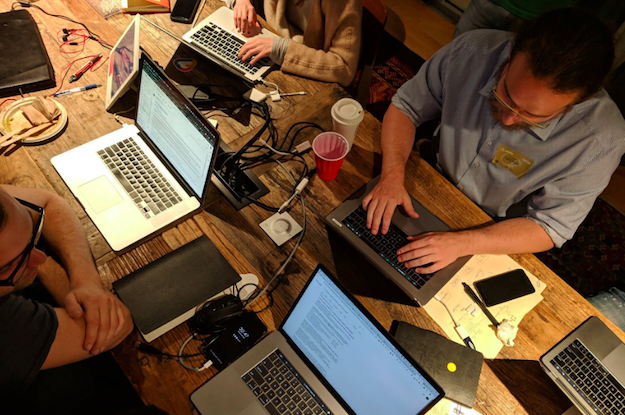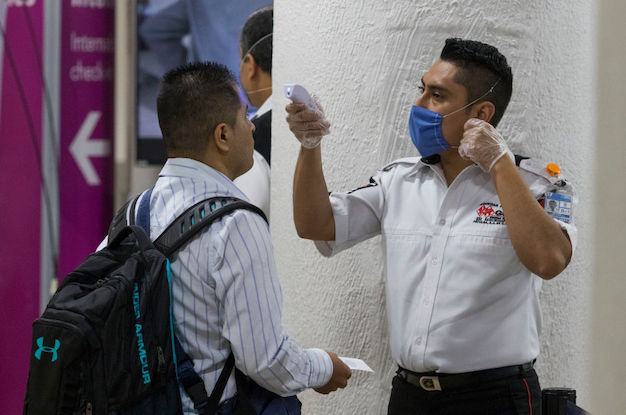Tracking blackout reports. Creating chatbots that connect Venezuelans searching for medicine to resources. Developing platforms to crowdsource scholarships for university students. Even diagnosing diseases.
Thousands of miles away from Venezuela, members of its growing diaspora are busy using new technology to tackle the country’s humanitarian crisis.
“I am amazed by the potential,” said Dr. Julio Castro at a San Francisco “hackathon” organized by Venezuelans in Silicon Valley earlier this month. A software engineer had just shown Castro how easy it was for an algorithm to diagnose malaria. The technology is a miracle for a doctor who treats patients in Venezuelan hospitals that often lack electricity and water, let alone the resources to hire and train personnel to document outbreaks of malaria, diphtheria, hepatitis A and measles in the country.
“It’s important to have real time data because if you have a window as an outbreak begins, you can intervene,” Castro told AQ.
The San Francisco event, held in conjunction with others in cities like Toronto, Buenos Aires, Santiago, and Barcelona, was organized by Code for Venezuela, a small group of Venezuelans in Silicon Valley working for some of the world’s biggest tech companies. Some 150 programmers across seven countries utilized everything from manual entry to machine learning in order to complete challenges set by organizers. These ranged from scraping and visualizing health data locked away in government PDF files to writing a chatbot which would help refugees find aid they desperately needed.
“I hadn’t found an outlet to be useful,” said Jonathan Gheller, a San Francisco-based programmer and entrepreneur who was born in Venezuela. “This is the most excited I’ve been that the things we can do here can be of service to Venezuela.”
More than three million people have fled Venezuela in recent years, escaping food and medicine shortages, hyperinflation and long power outages. A first shipment of aid from the Red Cross arrived in Venezuela earlier this month, something I was glad to see having covered the country as a reporter on the ground for eight years. But even as aid comes in, talent continues to leave and new initiatives like Code for Venezuela offer a path toward leveraging migrants’ skills toward rebuilding the country.
“There’s been this talent drain, and we want to find the silver lining,” Jose Montes de Oca, a former Google engineer and one of Code for Venezuela’s organizers, told AQ. “We have this team of people who have been trained by world-class companies, and we want to channel that training back to Venezuela in effective ways.”
Code for Venezuela is doing this by leading a mentorship program to connect professionals in places like Silicon Valley with their peers back in Venezuela.
“One of our goals is to keep developing local talent in Venezuela,” said Marcos Ciarrocchi, one of the group’s organizers.
New technologies and processes are proving to be an innovative part of the efforts to connect Venezuelans in-country to the resources they need. Code for Venezuela is one example, but there are other initiatives, such as those providing Venezuelans with cryptocurrencies, which they can exchange for dollars. This can be a lifeline in a country where the local currency is near useless.
As a reporter in Venezuela until 2018, I covered everything from government corruption to food riots and anti-government protests. When trying to understand these events and learn economics, I realized that Venezuela is to economics what a black hole is to space and time: a distortion and breakdown of all that you think you know is true.
To understand the mess, I wrote code to get black market currency data and central bank figures, as well as flight and health data. I published this through a website and mobile apps that became popular, demonstrating a need for this information not just from Venezuelans but also NGOs, academics and investors that can act on it.
Neither my efforts with data or those from Code for Venezuela are a panacea for Venezuela’s ills. That battle is being fought on many fronts. But the software projects are already providing insight into the crisis and offering help to those most in need.
“Many of us left Venezuela because of the conditions there. That created a need in us to help in some way,” said Rafael Chacón, a software engineer at Slack. “We see this as an opportunity to start setting the foundations for the country we want.”
—
Gupta is the founder and CEO of Data Drum. He worked in Venezuela as a journalist for eight years.








